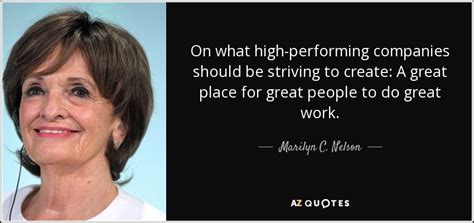A Quote by Jeffrey Gitomer
Value-first is a perception. If your customer does not perceive it as value, then it's not very valuable.
Related Quotes
I feel constantly the tension of the quarterly cycles, the drive to produce shareowner value at the cost sometimes of customer value and employee value. [But] if you take equal care of the employees, they will take equal care of the customers and then we will get an equal or better opportunity for our shareowners.
If in the human economy, a squash in the field is worth more than a bushel of soil, that does not mean that food is more valuable than soil; it means simply that we do not know how to value the soil. In its complexity and its potential longevity, the soil exceeds our comprehension; we do not know how to place a just market value on it, and we will never learn how. Its value is inestimable; we must value it, beyond whatever price we put on it, by respecting it.
In Burma, we have only about four percent of the people in our country who are (college) graduates. So can we not value the majority? No, we must. If we just value the graduates, then does that mean our people are not valuable? I don't believe that. What is important is we need right people in right positions.
The birth of a new fact is always a wonderful thing to experience. It's dualistically called a "discovery" because of the presumption that it has an existence independent of anyone's awareness of it. When it comes along, it always has, at first, a low value. Then, depending on the value-looseness of the observer and the potential quality of the fact, its value increases, either slowly or rapidly, or the value wanes and the fact disappears.
The most important thing about the first sale is for the very first time in your life something written has value and proven value because somebody has given you money for the words that you've written, and that's terribly important, it's a tremendous boon to the ego, to your sense of self-reliance, to your feeling about your own talent.


































